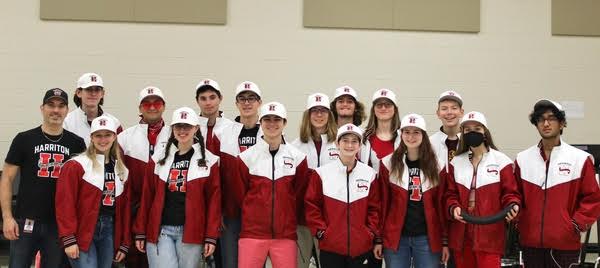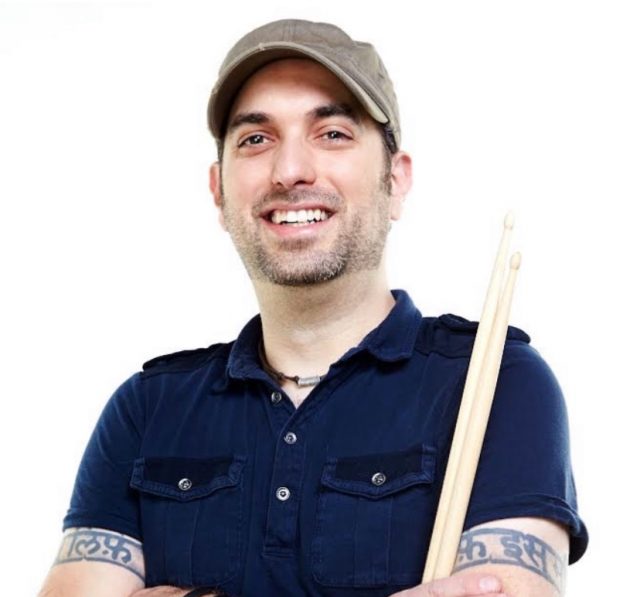An Interview with B.J. Capelli, Harriton High School RAMCHOPS DRUMLINE Director, Percussion teacher & Music studio Co-Owner
By Carmen Greger
B.J. Capelli’s Bio is quite impressive, I thought it definitely worth a share:
B.J. Capelli is a professional musician, educator, author, and speaker. His teaching, speaking, and writing draw from his experience as a performer and from having worked in wide variety of music industry positions including: commercial rock radio DJ; nightlife promoter and performer; music instrument retail manager; music coach and consultant; and as the head of drums and teacher training for a chain of music schools.
B.J. is a former high school band director who holds a degree in Music Education and is a New Jersey certified K-12 Teacher of Music. He has worked with student performing groups at all levels, amassing numerous awards, accolades, and commendations. As a private percussion teacher, B.J. has taught nearly 30,000(!) lessons. His students have gone on to distinguished music programs such as The Julliard School, Berklee College of Music, University of Michigan, University of Miami, and Interlochen Arts Academy, and many have become accomplished professional performers and teachers… and even a member of the Rock and Roll Hall of Fame! (Dick Boccelli AKA Dick Richards of Bill Haley’s Comets)
He now operates an audition-only studio of drum and percussion students, many of whom can be found performing in elite Philadelphia-area bands and ensembles.
His book, Armchair Drummer: The Easiest Way to Start Playing the Drums, is built to bring the joy of drumming to the masses. The book also serves as the foundation for “Bang It Out!” a team development and wellness program which he delivers to corporate and non-profit organizations, and for a clinic series, “Play the Drums…Today!”
His forthcoming book, Think Like a Musician: 9 Ways to Be Better At Just About Everything, harnesses wisdom and lessons from performers across the musical spectrum to improve artistry, creativity and excellence in all facets of life.
B.J. also maintains an active performing and recording career which has allowed him to work with members of Seether, Gym Class Heroes, Work Drugs, The Sleeping, The A.K.A.s, Rush Week, and a number of other prominent artists, while appearing on hundreds of stages from clubs and halls to stadiums and arenas.
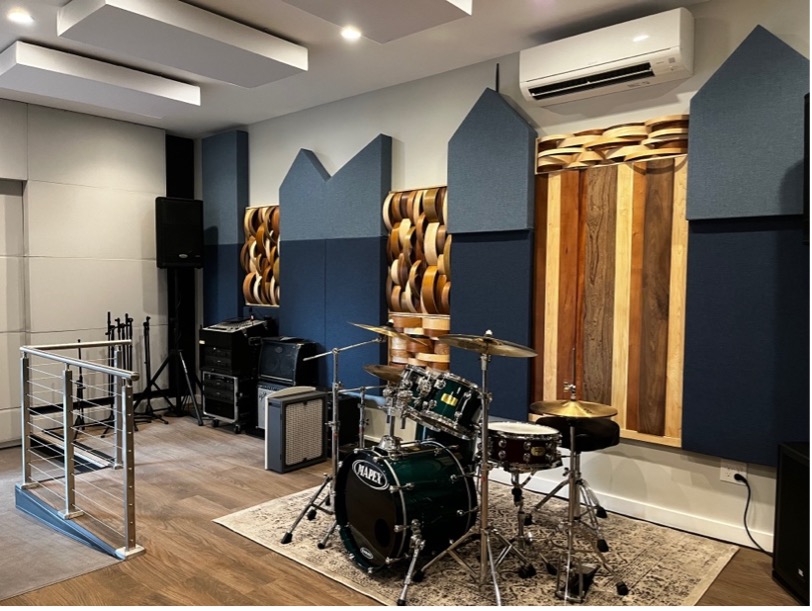
PF: BJ, you obviously do so much for the students in our community. As a Drumline and Pep-Band Coach, High-school Percussion Teacher and Studio Owner, what is the most important part of what you do?
BC: It’s all important, because it’s all essentially doing the same thing through various pathways. I like to say I don’t teach percussion or music, I teach people. Music is just the vehicle. While I obviously teach students the technical aspects of playing percussion instruments or music production or songwriting, what I really hope to do is teach the pursuit of excellence, which is applicable in all facets of life, not just music. We get there by developing skills like analysis, goal-setting, attention to detail, and collaboration and qualities like ambition, perseverance, sense of community, and an appreciation for diverse influences, arts and culture.
PF: What made you decide to get involved with teaching percussion?
BC: Well, my original life plan was to become a rock star, literally, and I revisited that path a few times over the course of my life. And while I never quite got to the level of world-renowned (at least not yet), I have had the chance to share a lot of amazing stages with a lot of amazing musicians. When I first went off to college, I intended to become a composer to write music for the film and media industries. I discovered teaching almost by accident. After a very brief stint at Florida State University, I went back home to New Jersey, and though my time at FSU was academically unsuccessful, I had expanded my marching band percussion knowledge and capability tenfold while there. So my first teaching experience was going back to work with the drumline at my old high school using that newfound capability to boost the program. Around the same time, I took on my first few private drum students as a way to make some money and feed talent to the high school group. I fell in love with teaching, had huge success with my students early on, and realized it was my real calling in life. In less than a year, my entire path had shifted, and I was being hired to coach drumlines all over NJ and had a full teaching schedule of private students. From there, I returned to college and became a full-time high school band director, while continuing to teach other competitive drumlines and my private students.
PF: Tell me about your life outside of percussion….
BC: Most of my life outside percussion is still pretty music-centric. When I’m not teaching, I produce music for other artists, and I write and record a lot of my own music too. I’ve also carried my years of building successful teams into the corporate setting through team development programs and speaking engagements. I love bringing a musical and artistic perspective into an arena where collaboration and creativity are coveted but rarely developed. Not everyone needs to play an instrument to become better skilled and more fulfilled through music’s influence.
Outside of work life, I’m somewhat obsessive about hockey and a diehard Flyers fan #BleedOrange. My wife, Leslie, and I are fortunate to have been living in Ardmore for many years and we’re definitely enjoying the amazing renaissance it’s having with so many great breweries, restaurants, music venues and everything else within walking distance. Also, the bulk of our free time, whether at home or out of town visiting our families (we’re both transplants to the Main Line), is usually spent with our sweet, photogenic Boston Terrier, Bailey.
PF: Tell us more about the amazing studio you just opened… who is your partner and what is your mission?
BC: It’s a 30+ year dream come true! My 12-year-old self would be so excited. My partner in the studio, and in life, is my wife Leslie. She’s a phenomenal musician and piano instructor, at the top of a list of massively impressive abilities and accomplishments. We’re similarly driven and business-minded, and we both wanted to expand our capabilities and reach beyond mostly local teaching and corporate programs. For close to seven years, we were looking for a place to build a studio to establish as a home base for our growing businesses. We had been traveling as mobile teachers, and almost half the space in our house was occupied by music equipment and other business-related stuff; we needed a studio BADLY.
After looking at dozens of potential places, we circled back around to the owner of a neglected building in our neighborhood that we had spoken to years before to no avail. But this time he was open to selling, and after months of negotiations, paperwork, etc., we closed on the building – right in the midst of the COVID-19 shutdown. Fortunately, while getting the sale across the finish line, we had lined up all of our contractors before the mad renovation rush that occurred, and we got a lot of our materials before the prices went too crazy and the supply chain dried up.
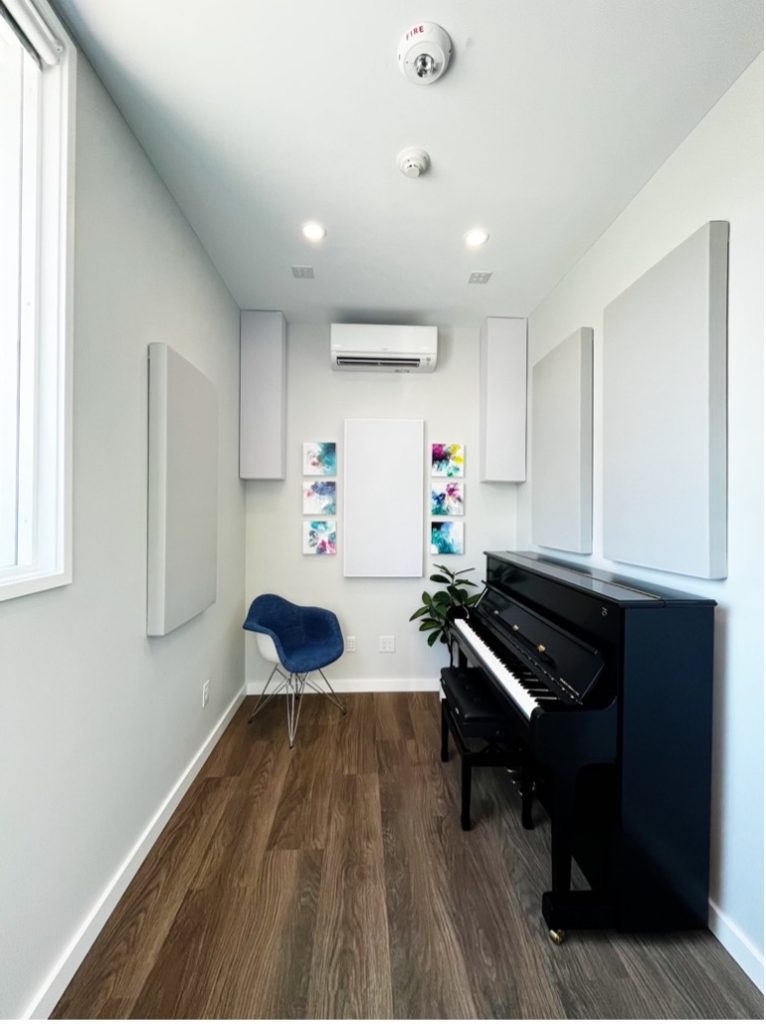
The finished studio is state of the art, with full audio and video production capabilities, a full complement of drums and percussion instruments, including timpani, mallet, and Latin percussion/hand drums, along with a variety of other equipment, and a nice piano of course!
Our mission is to use music and music education to improve people’s lives through multiple avenues:
1. The capabilities of our new facility allow us to provide the absolute best quality individual and small group lessons for drums, percussion, music production, and songwriting for all ages, as well as piano for adults and teenagers. Our students are studying these instruments, writing and recording songs, making videos, and performing on stage with professional musicians for my annual spring concert at the beautiful Ardmore Music Hall.
2. Soon we’ll be rolling out multiple types of local group experiences including rock and jazz ensemble classes; workshops and “play and sip” nights on a variety of music topics; as well as corporate offsite programs geared toward team development which are based on my book Armchair Drummer: The Easiest Way To Start Playing The Drums as well as my forthcoming book Think Like a Musician: 9 Ways To Be Better At Just About Everything.
3. We’re starting our expansion into the online space, which will be in the form of livestreaming, video lessons, and virtual versions of many of our in-studio programs, along with some other unique offerings.
PF: Can you walk us through the building process of your music studio?
BC: Do you have 12-14 hours to listen?… (laughs). I’ll give you the brief-ish version. We started work on the building in the spring of 2020. The studio building is about 100 years old and was in pretty rough shape. There wasn’t an inch of the building that didn’t get some attention. We ended up taking it all the way down to the basic structural shell and rebuilding it according to our specific needs, which included hiring a contractor team that specializes in recording studio construction. To save some money on the project – and to really have our blood, sweat and tears in it – I worked as a laborer for the contractors every day of the renovation while still teaching a full schedule of lessons online. We had trades onsite for about six months, after which Leslie and I did almost all of the remaining work from finishes, interior design, lighting, flooring, and a million little details that I can hardly comprehend, looking back at it. We even designed and built most of the extensive acoustic treatment in the rooms ourselves. We’re beyond proud of what we accomplished, but man, it was exhausting.
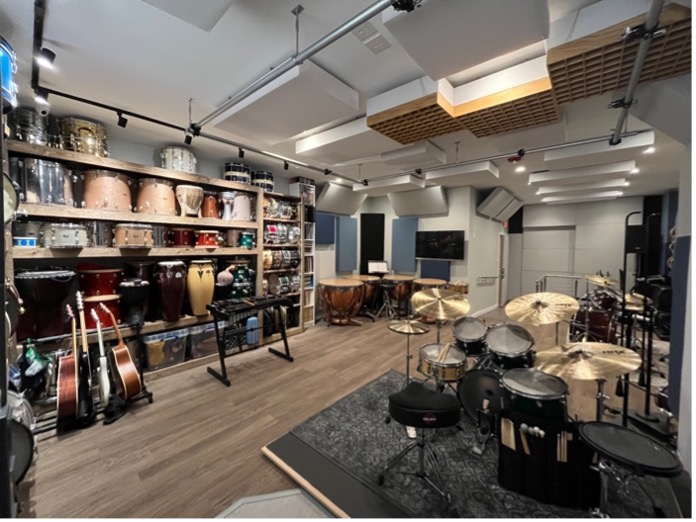
PF: Why does percussion speak to you so deeply?
BC: Initially, I think I was born with it. There are pictures of me, at I think my second birthday, getting a toy drum for a gift. Our family legend is that I ignored my other toys after that. I always wanted to be a drummer, long before I had the chance to join the school band or take lessons. It’s only grown from there. There’s a primal power and joy in the sound and physical vibration of percussion instruments that humans are just drawn to. That sense tends to carry over into percussion culture. Unlike some other instruments whose players tend to be more isolated and standoffish toward each other, drummers and percussionists are really tribal and generally love to be around each other, talk shop, and play together. It’s a great community. I try to foster that in my students too.
Also, percussion is so wide-ranging and diverse. I don’t just play and teach an instrument, I play and teach hundreds of instruments in a variety of sizes, shapes, forms, and from a variety of cultures and places. I’ve learned so much about the world and the people in it through percussion and music in general. It’s at the core of who I am as a person.
PF: What’s the best experience you’ve ever had at a drumline performance and why?
BC: I’ve had so many great experiences as both a performer and instructor, but if I had to pick one, I’d go with the first championship one of my groups ever won. It was my first ever season running a drumline, I was flying mostly solo as a coach, and I don’t think I had ever committed so much of myself to anything before. When the band came off the field, something told me that we were taking home a big percussion trophy that night, and when they announced the winner, the trajectory of my life changed – I was hooked.
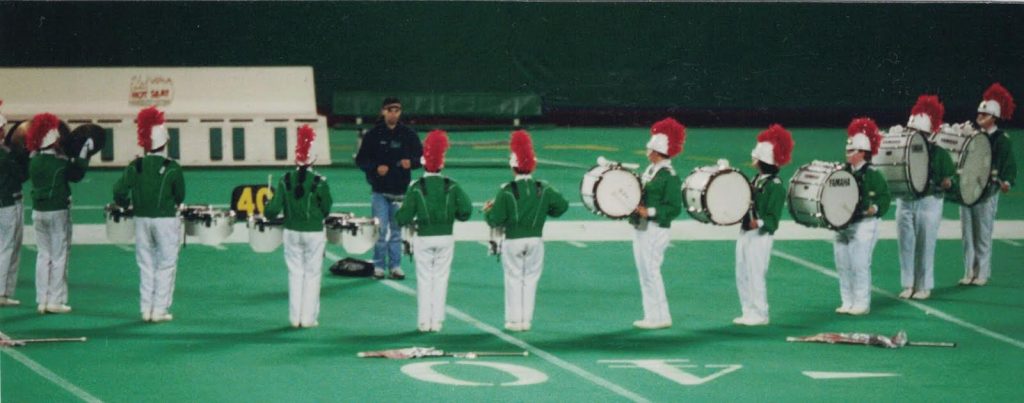
PF: Top ten drum line songs you’ve taught.
BC: While not “drumline songs” specifically, over the past 25+ years, I’ve had the chance to work with a lot of incredible programs doing fantastic shows. I spent a number of years with the Southern Regional High School marching band in Manahawkin, NJ where we won the Tournament of Bands Atlantic Coast Championship three consecutive years with some powerhouse shows featuring incredible percussion performances.
My favorite of those was “Locomotion” (video on YouTube https://youtu.be/6e8buKXUZiI?t=167). I also had a chance to lead the design of a Pearl Harbor themed show at my alma mater Mainland Regional HS, where I taught the marching band for seven years, that featured not only what some people considered the best high school bass drum line in the country that year, but college level marimba playing, more gongs than you can imagine, and even a segment where the drumline took off their drums to legit swing dance with the color guard!
At Harriton, the centerpiece of our drumline performance is something we call “The Sequence,” a collection of short cadences that are built to segue from one to the next. Some of those cadences are traditional “standards” that have been played at Harriton for a long time and go back as far as 50 years in their original forms, while newer segments are added or retired each year. I love the process of teaching pieces that both become a “shared language” with all alums of RamChops – and in some cases drumline members from around the world – as well as cool and current grooves, memes, etc. that hit hard for a season or two then head off to a farm upstate (laughs).
PF: Is there a song you have not yet introduced to your drumline team that you are looking forward to teaching them?
BC: Since we spend most of the season adding more of the segments to “The Sequence,” there are a couple of the traditional cadences that this years’ group didn’t get to. We’re still rebuilding the program post-pandemic, so it will take a couple years to get the whole group trained to the level where we can learn, memorize, and polish all the repertoire in the limited time we have in our season.
PF: Love that you put the trashcans in the lineup… can you explain your methodology?
BC: I love the trashcans, or Canz as we call them. We have a big drumline at Harriton this year – the biggest we’ve ever had – and based on the equipment we have and the experience necessary in each traditional drumline voice (snares, tenors, basses, cymbals), I knew we’d probably need to add another section. It’s not uncommon for drumlines to have sections like “flubs” – marching single tom-toms – or Latin percussion like timbales or bongos. I wanted to do something different, and we already had the cans themselves for a percussion ensemble piece we did last spring, so I wrote parts for those and added them to the mix. The loud, metallic sound is perfect for adding impact to our material. Plus, they’re visually awesome – who isn’t going to pay attention to someone swinging around a metal trashcan and hitting it with bass drum mallets?!
PF: Have you ever gone to STOMP? Would you recommend it to your students?
BC: Yes, I’ve seen STOMP a few times, and when I was teaching high school full time, I showed the movie to all of my classes and had them create their own STOMP segments. When I was around 17 or 18, STOMP was just getting going, and I was prepared to go to NY to audition, but it would have meant leaving school, so I ultimately decided against it. I did the same thing a few years later when the show BLAST! was being put together. I had an offer for a spot in the show from the percussion arranger, Thom Hannum, who’s a legend in the marching percussion world. At that point, it would have meant leaving college and an Assistant Marching Band Director position. Looking back, I think I made the right decision both times. I did eventually perform in a similar show in Atlantic City, “Rhythm Kitchen,” for a couple years, which was the only time (so far) that I’ve played a circular saw onstage!
PF: During your yearly percussion ensemble concerts, you conduct the performance as an interactive experience, involving and teaching the parent and sibling filled audience about all things sound and music; what drives you to lead and share in this very special way?
BC: My reasoning is twofold: While most people are generally familiar with what they’ll see and hear at a concert featuring a rock band, jazz group, orchestra, choir, or even a school concert band, most non-percussionists or people who haven’t studied music in a college setting aren’t familiar with the percussion ensemble medium. This type of ensemble began as more or less the percussion section of an orchestra playing by itself, but quickly became a go-to for experimentation for established composers and has evolved into a wide-ranging, interesting and sometimes utterly strange musical format. From the instruments we use to the material performed, I feel like a lot of explanation is necessary for an uninitiated audience to get the most out of the performance. And as an educator, that’s part of my job. Most directors share that information via printed program notes, but I think it’s more interesting to hear the story from the horse’s mouth, so to speak. That directly ties to the second consideration: logistics. Percussion ensemble concerts often include a lot of time moving equipment and setting up between pieces, and I’d rather fill that time with something engaging for the audience than have them watch us carry instruments around the stage for five minutes.
PF: Top 5 college current drumline groups to watch and why…
BC: It’s hard to give a top 5 for a couple reasons:
1. There are so many college bands and so many good drumlines playing for those bands 2. There are a few different styles of band/drumline in the college ranks: traditional bands that usually have all members marching (no “pit” percussion instruments on the sideline) and often no color guard using flags, rifles, etc.; corps style bands that follow the format of drum and bugle corps, which is generally considered the top of the marching arts world; and show bands, which are often found at HBCU’s, and often have a flashy marching style (if you’ve ever seen the movie “Drumline,” it’s that).
Having said all that, a couple drumlines I suggest people check out this year are West Chester University and University of Colorado which both have Harriton drumline alums as members! Also, Mark Reynolds at Ohio State University is doing phenomenal things bringing corps style quality to a traditional band program. And there’s recently been videos circulating of Louisiana State University drumline performing with famous New Orleans drummer Stanton Moore, which is something even the average music fan with no knowledge of marching arts would love.
PF: Top 3 percussionists of all time past, present, future and why?
BC: My favorite drummer now, and for almost 30 years, is Bill Stewart. He’s a jazz drummer that’s played with a host of top tier musicians (since jazz musicians don’t usually have one steady band like rock musicians tend to do). His approach to the drums is very quirky, but infinitely smooth and musical, and he plays with a sensitivity that feels like the drumming equivalent of shouting in a whisper, if that makes any sense.
My all-time favorite rock drummer is John Bonham from Led Zeppelin. His drumming is the equivalent of shouting through a megaphone, but with an unbelievable amount of groove and finesse. He is part of a small group of drummers from that era that basically set the ground level definition of what rock drumming is.
The other drummer/percussionist most important to me is Mickey Hart from the Grateful Dead, but not because of his playing with the Dead. He was hugely influential to me because of the books he wrote about his deep journey into the world of ethnomusicology, percussion, and world cultures. As a young teenager, his books opened my eyes to a whole other dimension as a musician and as a person. I also think that planted the seed that I could be an author as well as a musician, and as I currently work on my second book, that may turn out to be the biggest influence of all.
PF: If you could jam with any percussionist or group of any time, who would it be and why?
BC: You might laugh at this, but I would go with Taylor Swift and the musicians she used on the “Folklore” and “Evermore” albums. I’m cheating a little because those are members of a few bands I really love, but she’s such a phenomenal songwriter and performer, and those albums are both masterpieces in writing, production, and everything else. Even though I’m primarily a percussionist by trade, I tend to be more inspired by writers, producers, and songs themselves than purely percussion based music, so that’s what I’d go for in a dream-scenario jam session.
PF: First impactful song you can recollect and why…
BC: Well, I know from my baby book that the first song I sang, at age two, was “A Bicycle Built for Two,” or “Daisy” as I called it. Not too long after that, having grown up with two older sisters, I was apparently also singing, “We don’t need no education…” and some Frank Zappa lyrics that aren’t fit to print (laughs). I remember a lot of songs from when I was very young, but I think one that was particularly impactful for me was “Jam On It” by Newcleus. I was a hip-hop early adopter (laughs), and I think that early to mid-80’s rap probably had the most profound influence on my musical concept and playing. I don’t know, this is hard…
PF: Top ten songs on your lifetime playlist
BC: You’re killing me with these all-time questions… If you could see the song database I have in my head, you’d probably think it was going to explode. It actually might (laughs!) I don’t know if I could do a definitive ten, but I can list a few songs and albums that have been particularly influential to me as a musician or songwriter:
“It Ain’t Me, Babe” – Bob Dylan
“Such Great Heights” & “The District Sleeps Alone Tonight” – The Postal Service
“Sweet and Dandy” – Toots and the Maytals
“Diamonds and Rust” – Joan Baez
“When The Levee Breaks” – Led Zeppelin
“I Can See Your House From Here” – John Scofield & Pat Metheny
the whole Guns n’ Roses “Appetite For Destruction” album
the whole The Roots “Things Fall Apart” album
the whole John Vanderslice “Pixel Revolt” album
I don’t know, may seem random, but that’s probably an accurate reflection of my musical tastes, so we’ll go with it…
PF: Any tattoos… if not, why, if so, why and of what?
BC: Ha! That’s kind of a funny question, but considering I’ve spent most of my life in the music business, I’m tempted to answer, “Of course!” The real answer is… yes, I have a bunch. However, up to this point, I’ve gotten them in places that aren’t generally visible or obvious and can be covered easily. That was a deliberate move working in education and being old enough to remember when they weren’t as common or as socially acceptable as they are now. I haven’t gotten any in a while, but at this point, I’d be less concerned about visibility, and I do have some brilliant tattoo artist friends who are due to add to my collection. My current ones do have some meaning – a couple music related, some that represent parts of my background, and one that represents Arhanta, an art/music collective that I’ve been involved with since high school. I’m also not opposed to getting something that I just like, without any particular meaning.
PF: What have we not covered here that you want Philadelphians and the World to know about BJ Capelli, your studio, your coaching and your great work?
BC: I guess just that I’m extremely lucky to wake up everyday and do the thing that I love, that I believe I was put on Earth to do, and that has given me a path to building and growing a business – and to do it alongside the best partner I could have imagined. There’s not much more I could ask for than that.
And also, of course, if Philadelphians and anyone in the World have any interest in playing drums or percussion, learning how to create their own music, better understanding the music they love, or using percussion and music as a route to improve the cohesion and performance of their team, company, or organization, I’d love to help!
PF: How can readers, potential students, clients and collaborates best reach you?
BC: My website is BJCapelli.com, which admittedly is due for a serious update. Given the current instability in the social media world, they can also email me directly: [email protected]
https://www.youtube.com/@bjandleslie/videos
https://www.youtube.com/@bjcapelli/videos
Harriton on @bjcapelli
The Bones on @bjandleslie
PF: Let’s close here with B.J.’s words of wisdom.. what advice do you have for youth focused on making it big and broad in the wide world of percussion?
BC: I have a somewhat standard set of initial advice I give to every student interested in pursuing music professionally. I’ll summarize:
1. Don’t expect a single, straight-line path. You can build a successful and financially rewarding career in music, but it won’t be as simple as getting a job and moving up the ranks.
2. You probably won’t get rich. You might get lucky, but don’t bank on it. If money’s the goal, pick a different career; passion is the only thing that will get you through the tough times and into the good times.
3. Use college strategically and don’t graduate $300k in debt if you want to be a musician. The monthly student loan payment will probably block you from taking most entry-level music opportunities.
4. Be psychologically prepared to sometimes hate the thing you love the most. When music goes from being your escape/hobby/outlet to your job – even when you’re studying in music school – it’s very hard see the light at the end of the tunnel, but it’s there if you hang on during the rough ride.
5. Don’t have a “fall-back plan.” Contrary to what a lot of parents, counselors, and other people who haven’t worked in music say, splitting your focus won’t give you better job prospects, it’ll wreck the ones you would have had. If you want to be a teacher, major in Music Education so you get the necessary training and credentials. If you want to be a performer, majoring in Music Ed will take away important focus and practice time that your competition will have used to get an edge over you. You can always pivot later if you want a new career path.
6. Learn to play the piano if you don’t already. It’s the biggest skill I wish I had going into music school, and though I’m still a hack, it’s something I’ve used in almost every aspect of my music career.

